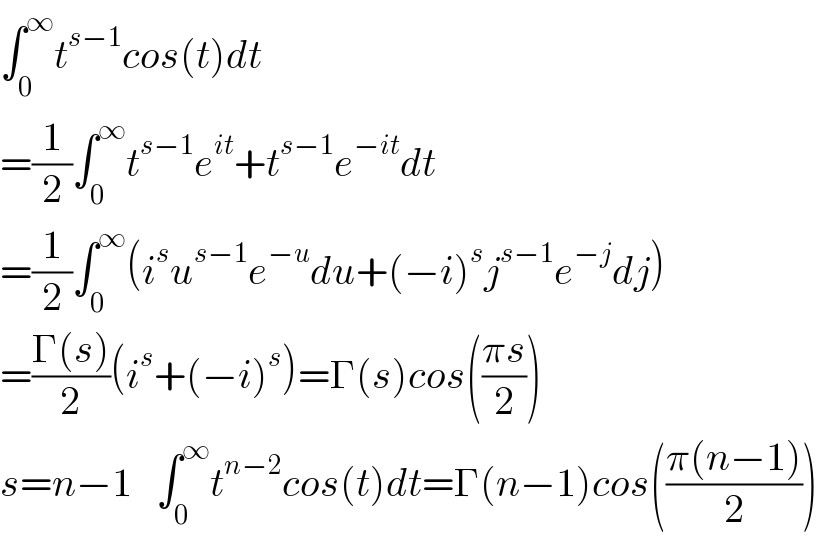Question Number 144432 by ArielVyny last updated on 25/Jun/21

$$\int_{\mathrm{0}} ^{\propto} {t}^{{n}−\mathrm{2}} {costdt} \\ $$
Answered by Dwaipayan Shikari last updated on 25/Jun/21

$$\int_{\mathrm{0}} ^{\infty} {t}^{{s}−\mathrm{1}} {cos}\left({t}\right){dt} \\ $$$$=\frac{\mathrm{1}}{\mathrm{2}}\int_{\mathrm{0}} ^{\infty} {t}^{{s}−\mathrm{1}} {e}^{{it}} +{t}^{{s}−\mathrm{1}} {e}^{−{it}} {dt}\:\:\: \\ $$$$=\frac{\mathrm{1}}{\mathrm{2}}\int_{\mathrm{0}} ^{\infty} \left({i}^{{s}} {u}^{{s}−\mathrm{1}} {e}^{−{u}} {du}+\left(−{i}\right)^{{s}} {j}^{{s}−\mathrm{1}} {e}^{−{j}} {dj}\right) \\ $$$$=\frac{\Gamma\left({s}\right)}{\mathrm{2}}\left({i}^{{s}} +\left(−{i}\right)^{{s}} \right)=\Gamma\left({s}\right){cos}\left(\frac{\pi{s}}{\mathrm{2}}\right) \\ $$$${s}={n}−\mathrm{1}\:\:\:\int_{\mathrm{0}} ^{\infty} {t}^{{n}−\mathrm{2}} {cos}\left({t}\right){dt}=\Gamma\left({n}−\mathrm{1}\right){cos}\left(\frac{\pi\left({n}−\mathrm{1}\right)}{\mathrm{2}}\right) \\ $$
